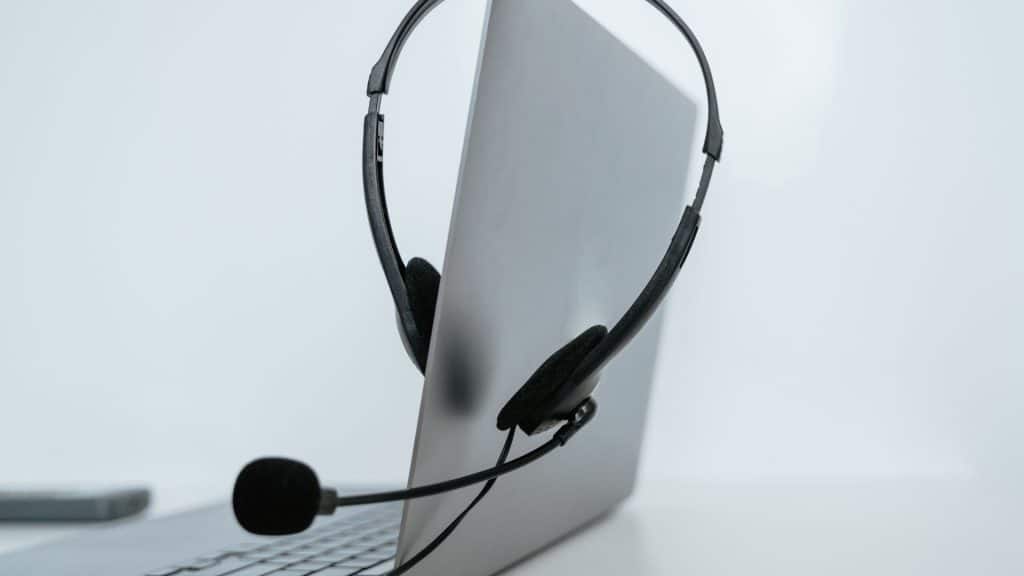If you are feeling tired all the time, it’s important to take care of yourself to prevent burning out. In our busy life, we often forget to put ourselves first. We’ve got a self-care checklist that is here to help you stay energized and avoid burnout.
Life can be like a whirlwind, with work, family, and responsibilities constantly pulling us in different directions. If we don’t take care of ourselves, we risk burning out. You might think, what is burning out? Sometimes, we don’t notice when we’re getting close to burnout. Burnout happens from too much stress, which can even harm your body.
Whether it’s setting aside time for relaxation, hydration, or staying active, this checklist covers it all. It is designed for everyone, no matter how busy or budget-conscious you are.
So, if you’re ready to put yourself first and ensure a happier, more balanced life, we’ll walk you through the essential self-care practices that can make a difference in your well-being.
So, let’s start self-care together!
What is a Self-Care Checklist?
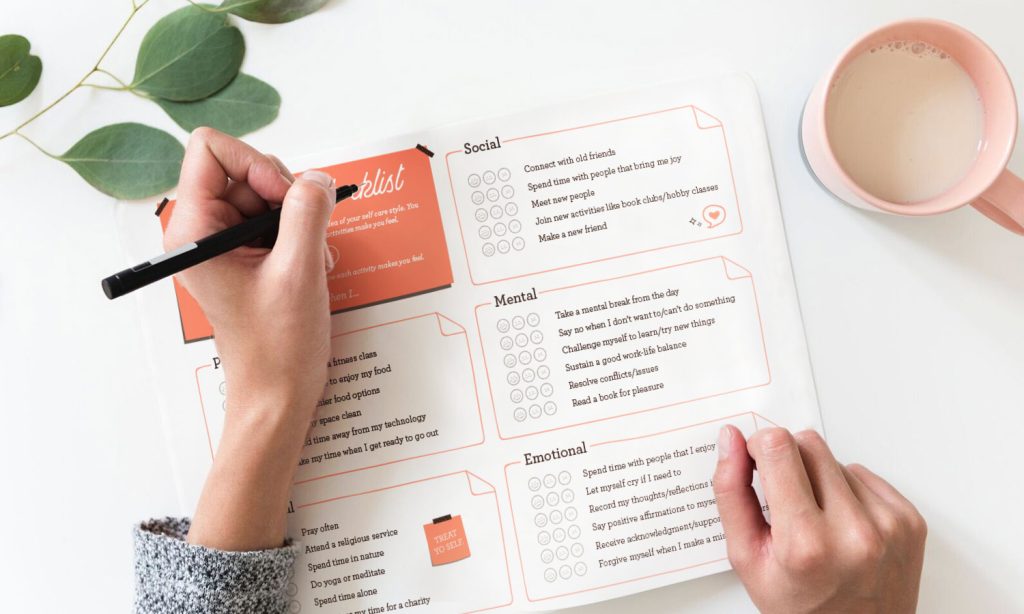
A self-care checklist is like a helpful tool to ensure you take care of yourself in body and mind. It’s like a reminder list that tells you to do things that keep you from getting too tired and improve your life.
A self-care checklist lists things to do every day, week, or month to care for yourself. These things can be all sorts of stuff, like exercising, relaxing, or spending time with friends. The point is to make sure you do self-care regularly.
One big thing about a self-care checklist is that it helps you set realistic goals. Instead of trying to do everything simultaneously, you break it down into smaller, doable steps. This way, you’re more likely to do self-care and not feel too overwhelmed or frustrated. That’s why a self-care checklist is a great tool for keeping yourself healthy and happy.
What is Burning Out?

Burnout happens when you’re super tired, both in your head and body, because you’ve been stressed or working too much for a long time. When you’re burned out, you might stop liking things you used to enjoy, have trouble focusing, and feel tired all the time. It can mess up your job, relationships, and how you feel in general. It’s really important to notice these things.
Daily Self-Care Checklist Activities
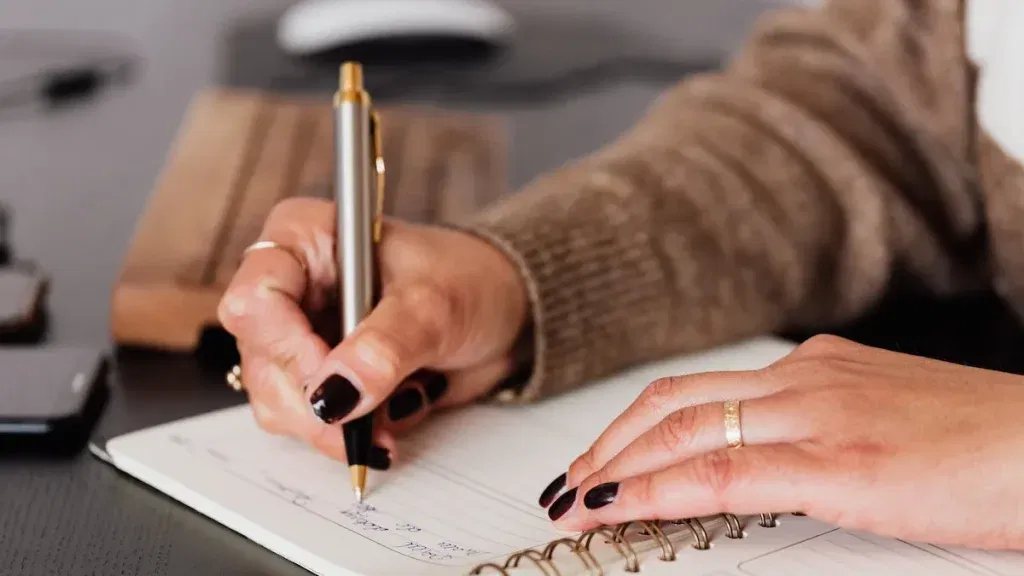
1. Morning Meditation: Start your day with a few minutes of quiet meditation. Focus on your breath and clear your mind of the crowd. This helps reduce stress and sets a positive tone for the day.
2. Healthy Breakfast: A nutritious breakfast provides energy and concentration. Include whole grains, fruits, and proteins like eggs or yogurt to fuel your body.
3. Hydration: Drink plenty of water throughout the day. Staying hydrated is essential for physical and mental well-being. Aim for at least eight glasses a day.
4. Regular Breaks: Take short breaks during work or study sessions. Stretch, walk, or relax for a few minutes to recharge your mind.
5. Exercise: Engage in regular physical activity. Whether it’s a brisk walk, yoga, or dancing, exercise on mate releases endorphins that boost your mood.
6. Healthy Snacks: Eat nutritious snacks like nuts, fruits, or veggies to maintain stable blood sugar levels and avoid energy crashes.
7. Social Connection: Spend time with friends and family or connect with loved ones virtually. Social interactions provide emotional support and reduce feelings of separation.
8. Mindful Breathing: Practice deep breathing exercises when stressed. Inhale slowly through your nose, hold, and exhale through your mouth. This calms the nervous system.
9. Limit Screen Time: Reduce excessive screen time on phones and laptops, especially before bedtime. Blue light from screens can disturb sleep patterns.
10. Hobby Time: Dedicate time to your favorite hobbies or interests. Doing what you love brings joy and relaxation.
Weekly Self-Care Checklist Activities
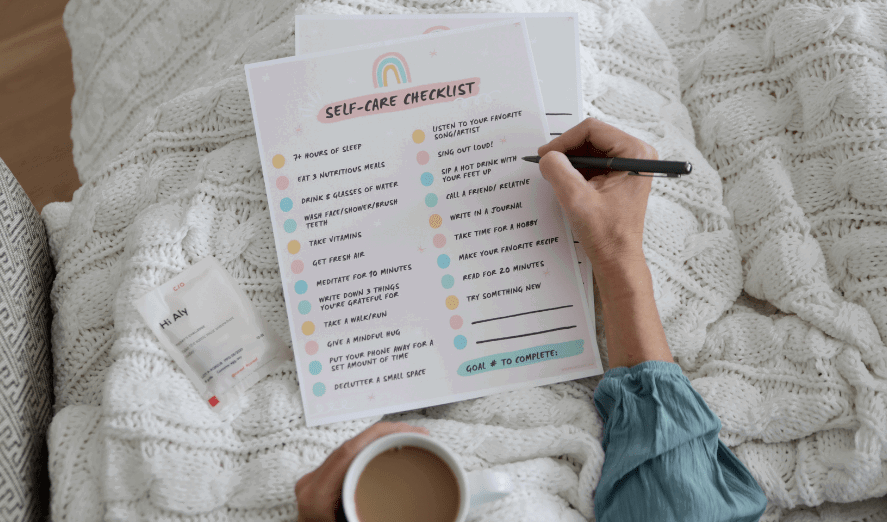
Savor Your Lunch Break in a Different Setting
Changing where you eat your lunch can make you feel better mentally. You can try eating in a park, a nice cafe, or even in a different room at home. Being in a new place can help your mind feel fresh and stop your workday from getting boring. This break can give you more energy and help you concentrate better when you return to your tasks.
Tackle Home Tasks and Domestic Duties
Doing household chores might not seem exciting, but it can make you feel good. When you tidy up your home, it makes things neat and organized, which can lower your stress. Plus, finishing chores can give you a feeling of achievement and leave you with more time to do fun stuff.
Prioritize Self-Care with Physical Relaxation
Self-care isn’t only about how you feel inside; it also involves giving your body a break. Whether it’s soaking in a cozy bath, doing a short yoga routine, or spending just 10 minutes meditating, taking a little time to unwind physically can help ease tight muscles, lower blood pressure, and make it easier to get a good night’s sleep. Write everything in your self-care checklist.
Engage in a Heartfelt Conversation with a Loved One
Setting aside time for a heartfelt chat with someone you care about is crucial for looking after yourself. It’s not just about chit-chat; it’s about forming a stronger connection. Writing everything in a self-care checklist is important. Studies indicate that these talks can trigger the release of oxytocin, a hormone that helps lower stress and strengthens emotional bonds.
Reconnect with Nature by Going on a Scenic Hike
Recharging your mind and body is easy when you spend time in nature. Taking a peaceful hike lets you leave behind the busy daily routine and enjoy the outdoor wonders. Studies show that being in nature helps you feel less stressed, happier, and smarter. What’s more, hiking also gives you a good workout.
Monthly Self-Care Checklist Activities

Go for a Relaxing Spa Session
Relaxing at a spa isn’t just a fancy treat; it’s an important way to care for yourself. When you go to a spa, you usually get nice massages and calming facials, and you can even relax in hot tubs or saunas. These things can help you feel less stressed, make your blood flow better, and relax your muscles. Also, the spa’s environment helps you feel mentally relaxed.
Embark on a Fresh and Exciting Experience
Life can become boring if you don’t step out of your comfort zone. Trying something new, like taking up a new hobby or going on an adventure, is a fantastic way to energize your spirit. It revives your brain and boosts your confidence. Whether it’s learning to cook a new cuisine or going on a hiking trip, these experiences keep life exciting.
Take a Day Off on Social Media for a Full Day
Our non-stop use of social media can be overwhelming. Taking a day off from digital devices like laptops and phones can help you concentrate on what’s happening right now, making you less anxious and clearer in your thoughts. You’ll notice that you’re more involved in what’s around you, and you’ll appreciate the calm and peacefulness of the world.
Enjoy a Lunch Date with a Friend
Building and nurturing social relationships is important for our overall happiness and mental health. When you have lunch with a friend, it’s a wonderful chance to chat, exchange stories, and share some laughter. These moments not only deepen your connections with others but also offer emotional support. It reminds you that you have companions on this journey called life.
Emergency Self-Care Checklist Activities
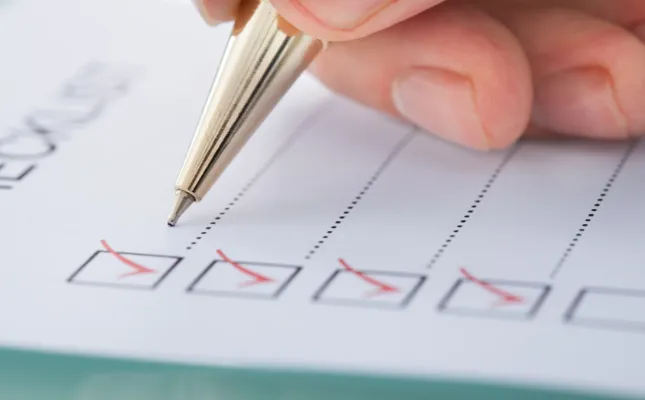
Do Makeup with YouTube Tutorial
Makeup is a fun and artistic way to show who you are. You can find lots of makeup lessons on YouTube because of the internet. You can learn how to do various styles, like simple or fancy, and get expert tips. Trying out makeup can make you feel better about yourself and more self-assured. It’s a way to express yourself and feel calm and strong simultaneously. Plus, it’s a skill you can improve over time, which is good for taking care of yourself.
Listen to a Motivational TED Talk
When life gets tough, watching a TED Talk can give you a dose of inspiration and motivation. These talks talk about lots of different things, like how to be better, new ideas, and being creative. You can find them easily on the internet, and really smart people usually give them. Watching a TED Talk can help you see your problems in a new way and remind you of what’s important to you. The people giving the talks share their own stories and ideas, which can connect with your own life.
Groove on Solo Dance Fiesta
Dancing is a fun and free way to reduce stress and make yourself feel happier. You don’t have to be a great dancer or perform in front of others. Play your favorite music on Alexa and dance however you want in your own private space. Dancing alone is a way to express yourself and connect with your feelings. It’s like having a party just for you, where you can dance away your worries and enjoy the moment. Dancing is a great way to release built-up stress and feel the pure joy of moving your body.
How to Make a Self-Care Checklist

1. Significance of Self-Care
Recognizing why self-care matters is crucial in avoiding burnout. It’s important to know that self-care isn’t being selfish; it’s vital for keeping both your body and mind healthy. Self-care means doing things that make you feel better, lower stress, and keep you in good shape. Changing your mindset to understand that taking care of yourself isn’t just for you but also for your ability to assist others is important.
2. Set Time for Self Care
To prevent burnout, it’s important to set aside regular, uninterrupted time to care for yourself. You can do this by scheduling an hour every day in a Self-care checklist for things like exercise, meditation, or doing activities you love. When you create this routine, you prioritize self-care, which helps you avoid forgetting it when you have a busy schedule.
3. Check some Self-Care Routine
When making a self-care checklist, it’s vital to keep it practical and consider your responsibilities and boundaries. While fancy self-care plans might seem nice, they can be too much to handle. Instead, concentrate on doable activities that you can regularly include in your daily or weekly schedule. Begin with small steps, and slowly add more self-care routines over time.
4. Make a Self-Care Checklist
Creating a personalized self-care checklist is essential because what helps one person might not help someone else. To make your checklist, consider what activities and strategies connect with you. Your checklist should match your own needs, likes, and situation. Doing this ensures your self-care routine works well for you and you can stick with it.
Why Create a Self-Care Checklist?

In a fast-moving era where burnout is a serious issue, looking after yourself is crucial. A self-care checklist is a helpful tool for ensuring you take care of your mental health and well-being. It’s an easy but powerful way to keep track of and handle self-care tasks, which can lead to a healthier and happier life. When you make a self-care checklist, you create a structured daily plan that includes different self-care activities. This helps you deal with stress and avoid burnout.
Conclusion
As we’ve seen, a self-care checklist is like a shield that protects us from burning out. It’s a simple but powerful tool to keep our minds and bodies healthy. Remember to take breaks, get enough sleep, eat well, and exercise regularly.
These are the main parts that build strong self-care for daily life. Setting boundaries is important; don’t let work or stress take over your life. Spend quality time with loved ones and do things you enjoy. This helps recharge your batteries.
Don’t forget to relax and breathe deeply when things get tough. Practice mindfulness and stay in the present moment. It’s like giving your mind a relief. Always ask for help if you need it. You’re not alone. A self-care checklist is your guide to a happier and more balanced life.
So, make your checklist, and watch how it keeps you safe from burning out because your well-being really matters!












